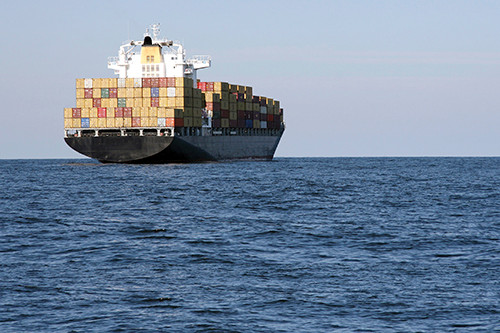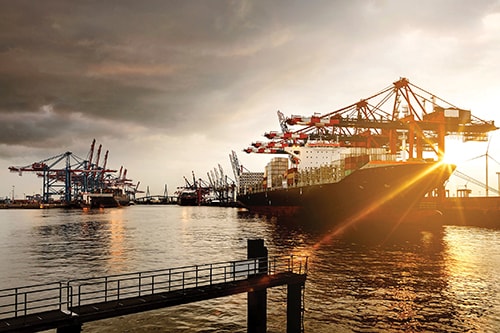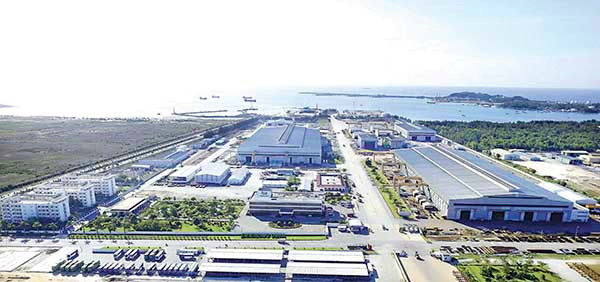Making sea - island economy targets realistic developing sea logistics system is in need
Thời sự - Logistics - Ngày đăng : 09:42, 11/09/2017
(Vietnam Logistics Review) Vietnam has a long coast of 3,260km with 1 million km2 of Exclusive Economic Zone – 3 times larger than Vietnam’s geographic area- and 3,000 islands of all sizes… therefore, potential for sea economic development is vast. The matter is how to develop the logistics sector and use it as a driving force to develop sea- island economy to match that potential?
In order to make the target of being a country enrich itself from the sea and of having 53-55% of total GDP from sea and coastal economy, restrictions in sea- island economy should be removed, especially in the logistics sector- a sector that plays an important role in providing necessary factors for activities on the sea and islands.

Potentials of sea- island economy and activities of the logistics sector
Vietnam has 28 cities and provinces, including 12 large cities, 120 coastal towns and wards in the total area of 208,560 km2, accounting for 41% of the country area and with the population of 41.2 million people, nearly half of the country’s population. Therefore, the sea- island economy has a very important role and has become a large economic sector with importance in term of defense and of integration and development. Sea- island economy is all sectors of exploitations on sea surface, under the sea and in the air including coastal exploitation service sectors as sea-port services, beaches, coastal cities, sea economic zones, and logistics centers; other sectors as oil, aqua-products, sea- island tourism, and search& rescue; sea- island logistics activities ensure frequent activities on sea and connect other economic activities as transport services and other assisting services for sea production and business.
The Government and Party has had many policies for sea- island economic development, noticeably the Resolution 09- NQ/TQ dated February 9th, 2007 on Vietnam’s sea strategy to 2020 with the target of making our country the strong and rich countries from sea economy with sustainable development. To implement the strategy, the Government has issued and approved various resolutions and decisions in strategies of exploitation, and using resources and sea environment protection as well. Sectors and local authorities has had strategies, plans, and activity plans and has had initial encouraging results. Large islands as Con Dao, Phu Quoc, Truong Sa, Phu Quy, Ly Son, Con Co, Cat Ba, Bach Long Vi, Van Don… have had infrastructures, transport network, electricity and communication network. At the same time, systems of industrial parks, seaports, fishing ports, and tourism zones from Quang Ninh to Ca Mau have been built, ensuring good national defense works.
Although Vietnam’s sea- island and coastal economy is in small scale with around USD 10bn (compared to USD 1,300bn from that of the world), the number has been increasing in the past few years. Business structures have changed in positive direction, with the development of sectors of service economy as oil exploitation, aqua-product, sea- island tourism, search& rescue. The whole country is divided into 15 general sea economy with oil refinery industry, industry attached to seaports, fishery logistics, sea transport and sea- tourism…

Vietnam has great potentials for sea economy, however, sea- island logistics sector has not been received proper attention to develop. We have been paying much attention to fishery sector, but not many things have been done. There should be more approaches to sea- island economic development. Systems of sea-island logistics with specific policies and mechanisms should been built and developed: developing and assisting developments sea economic sectors, connecting sea and land economy, aiming to the target that all vessels are safely operating on Vietnam EEZ in any situation. Currently, our international seaports are not connecting to our national railroad system and numbers of North- South expressway. And sea way which has had advantages has been neglected.
These are restrictions to sustainable sea- island economic development.
Logistics solution for sea- island economic development
For sustainable development of sea- island economy, there should be several initial solutions in logistics points of view as follow:
1. Improving awareness on developing sea logistics in Vietnam EEZ and avoiding the idea that logistics belongs to fishery sector or belongs to works of sea police, coast guard and search& rescue forces’.

2. Improving State’s management on sea-island economy, especially modifying suitable mechanism and policies. Increasing pollution control and preventing emptying exploitation that has been on the increase in many areas. Effectively dealing with climate changes and safe-guarding the country’s sovereignty.
3. Modifying and improving mechanisms and policies for logistics service developments from policies on developing enterprises, getting investment attractions for offshore logistics infrastructures and human resource development. Our existing policies have no place for sea- island economy.
 | Only with comprehensive logistics ideas, improved social awareness of an sea- island economic strategy, and sea- island sovereignty protection, Vietnam can be a strong sea country. |  |
4. Building national logistics infrastructure including sea logistics, especially transport infrastructures should include road, railway and seaway. The system should be built synchronously and connect to logistics centers, seaports and sea economic zones. Coastal transport road, North- South railroad, and railroads to seaports should be paid much more attention as premises for sea- island economic development.
5. Sea economic development should be built on logistics points of view, avoiding idea of local benefits that chops the coastal line for resorts or key national route for BOT stations, avoiding emptying exploitation with super projects or profit vulturing from the policy on ironclad ship building in accordance to the Resolution 67… Only comprehensive logistics idea and awareness of sea- island economic strategy connecting with sovereignty protection can make Vietnam soon to be a “strong sea country”.
6. Although infrastructures of some islands have been remarkably improved, there should be mechanisms and policies of investment for those which will be general economic centers in the future as Truong Sa, Hoang Sa, Ly Son, Con Dao, Phu Quoc… making these “outposts” to be logistics centers for the country and for other (experience from Singapore)
7. Tourism should be a spearhead economy sector, including sea tourism. There should be policies for fee and tax incentives to enterprises investing in sea- island tourisms. Maximum priority should be given to sea logistics enterprises investing in means of transport.
 | There have been so many policies for road and airway development, while seaway system is neglected. These are barriers that limit sustainable development of sea- island economy. |  |
8. More attention should be paid for scientific research on sea economy with practical projects, especially those on economy, sea- island logistics and management. Developing new sector and innovating existing ones for more efficiency in the fields of mineral exploitation, oil, ship building, sea- product processing.
9. Speeding up human resource training, in which there are human resource for sea logistics sector and human resource for sectors relating to sea exploitation. Local authorities should have more training for coastal residence community on specialized knowledge of environmental protection, sea law and other skills. Universities should have syllabus on sea economy, sea logistics and should have sea economy and logistics management in under-graduated and post- graduated programs for majors of economy, management and business administration.
